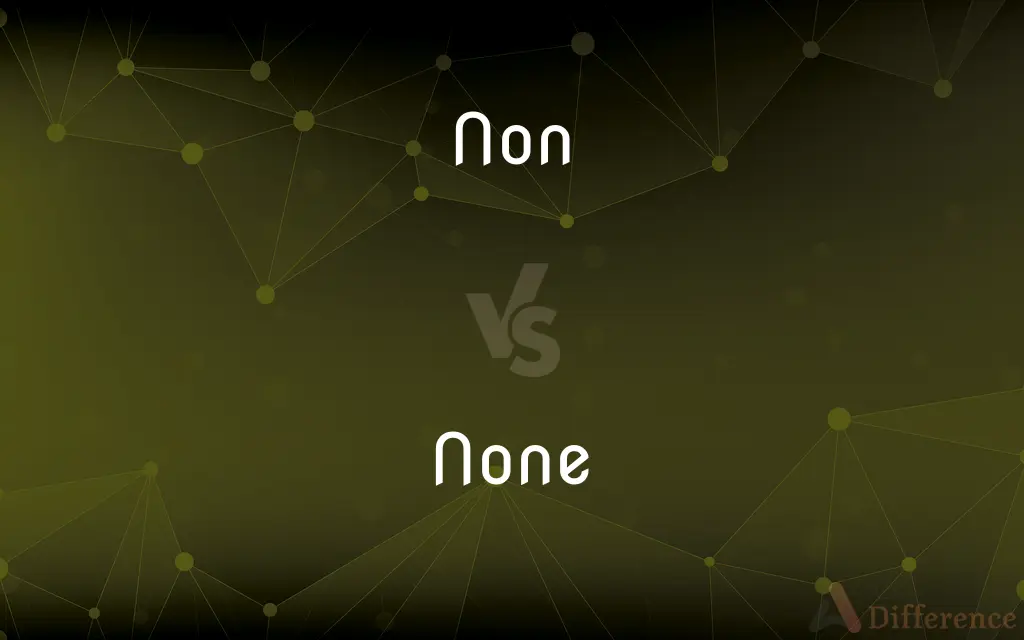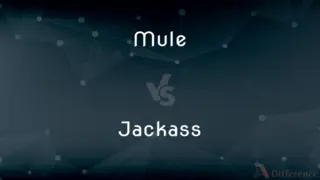Non vs. None — What's the Difference?
Edited by Tayyaba Rehman — By Fiza Rafique — Updated on September 25, 2023
"Non" is a prefix used to indicate the absence, negation, or opposite of something, as in "non-profit" or "non-toxic." "None" is a pronoun that means "not one" or "not any," used to indicate the absence of people or things.

Difference Between Non and None
Table of Contents
ADVERTISEMENT
Key Differences
"Non" is commonly used as a prefix in the English language to denote the absence or negation of the concept or quality of the root word it attaches to. For example, "non-smoking" means a place where smoking is not allowed. "None," on the other hand, stands alone as a pronoun, usually indicating the absence of something, as in "None of the apples are ripe."
While "non" attaches to nouns, adjectives, or even verbs to create compound terms, "none" usually takes the place of a noun and refers to the absence of it in some form. For example, "She is non-technical," uses "non" as a prefix to describe her lack of technical skills. On the contrary, "None of the employees are technical" uses "none" to describe the absence of any technical employees.
From a grammatical standpoint, "non" is a prefix and not a standalone word, while "none" is a pronoun. Both words serve to negate, but their roles and applications in sentences are quite different. While "non" is always part of another word, "none" is independent and can be the subject or object in a sentence.
"Non" and "none" have distinct but somewhat similar etymologies. "Non" comes from Latin, meaning "not," and is used in both Latin and English to create terms that signify absence or negation. "None" has Old English origins and stems from "nan," which also means "not one" or "not any." Despite their similar purposes of negating, the words are not interchangeable.
Comparison Chart
Grammatical Role
Prefix
Pronoun
ADVERTISEMENT
Usage
Attaches to other words
Stands alone
Meaning
Absence or negation
Not any or not one
Etymology
Latin origin
Old English origin
Sentence Role
Part of compound words
Can be subject or object
Compare with Definitions
Non
Non is a prefix denoting negation.
The event is non-profit.
None
None indicates absence.
None of the options are good.
Non
Non indicates absence.
This is a non-smoking area.
None
None has Old English origins.
The word 'none' comes from Old English.
Non
Non specifies the opposite.
He gave a non-answer.
None
None implies not any.
None were left at the end.
Non
Non comes from Latin.
The term non-toxic has Latin origins.
None
Not at all
He is none too ill.
Non
Non can attach to nouns, verbs, or adjectives.
She is non-committal.
None
In no way
The jeans looked none the better for having been washed.
Non
Obsolete form of none
None
Not any of a given number or group.
None of those is a good example. None are even acceptable.
None of this meat tastes right.
Non
A non-Muslim citizen.
None
No one, nobody.
None of those people is my father.
None
No person.
None of those people are my parents.
None
Not any; no (usually used only before a vowel or h):
Thou shalt have none other gods but me.
None
To no extent, in no way.
I felt none the worse for my recent illness.
None
Not at all, not very.
He was none too pleased with the delays in the program that was supposed to be his legacy.
We could hear none too well from the back.
None
(obsolete) No, not.
None
(chiefly American) A person without religious affiliation.
None
: the ninth hour after dawn; (Christian) the religious service appointed to this hour.
None
(obsolete) midafternoon: the time around or following noon or nones.
None
No one; not one; not anything; - frequently used also partitively, or as a plural, not any.
There is none that doeth good; no, not one.
Six days ye shall gather it, but on the seventh day, which is the Sabbath, in it there shall be none.
Terms of peace yet noneVouchsafed or sought.
None of their productions are extant.
None
No; not any; - used adjectively before a vowel, in old style; as, thou shalt have none assurance of thy life.
None
Same as Nones, 2.
None
A canonical hour that is the ninth hour of the day counting from sunrise
None
A service in the Roman Catholic Church formerly read or chanted at 3 PM (the ninth hour counting from sunrise) but now somewhat earlier
None
Not any;
Thou shalt have none other gods before me
None
Not at all or in no way;
Seemed none too pleased with his dinner
Shirt looked none the worse for having been slept in
None too prosperous
The passage is none too clear
None
None means not one.
None of the kids were present.
None
None can act as a subject.
None is better than this.
Common Curiosities
Can "non" be used with verbs?
Yes, though it's less common. Example: "Non-comply."
What does "none" mean?
"None" is a pronoun that means "not one" or "not any."
Is "non" a standalone word?
No, "non" is a prefix that attaches to other words.
Can "none" be used as a prefix?
No, "none" is a standalone pronoun.
What does "non" generally mean?
"Non" is a prefix that signifies absence or negation.
What is the origin of "non"?
It originates from Latin.
Can "none" be the subject of a sentence?
Yes, as in "None are available."
What is the origin of "none"?
It comes from Old English.
Can "none" be used for emphasis?
Yes, as in "None whatsoever!"
Are "non" and "none" interchangeable?
No, they have different grammatical roles and usages.
Is "non" always hyphenated?
Usually, but not always. Example: "nonsense."
Is "none" used in formal writing?
Yes, it's appropriate for all levels of formality.
Is "non" used in formal writing?
Yes, it's widely used in both formal and informal writing.
Can "non" attach to adjectives?
Yes, as in "non-toxic."
Can "none" refer to people?
Yes, as in "None of the people voted."
Share Your Discovery

Previous Comparison
Veranda vs. Porch
Next Comparison
Mule vs. JackassAuthor Spotlight
Written by
Fiza RafiqueFiza Rafique is a skilled content writer at AskDifference.com, where she meticulously refines and enhances written pieces. Drawing from her vast editorial expertise, Fiza ensures clarity, accuracy, and precision in every article. Passionate about language, she continually seeks to elevate the quality of content for readers worldwide.
Edited by
Tayyaba RehmanTayyaba Rehman is a distinguished writer, currently serving as a primary contributor to askdifference.com. As a researcher in semantics and etymology, Tayyaba's passion for the complexity of languages and their distinctions has found a perfect home on the platform. Tayyaba delves into the intricacies of language, distinguishing between commonly confused words and phrases, thereby providing clarity for readers worldwide.













































